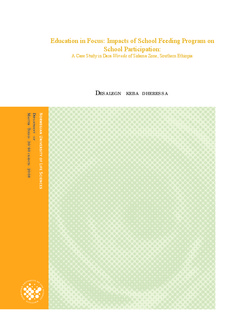| dc.description.abstract | It has been claimed that School Feeding Programs increase school participation among poor and food insecure group of people. This study investigates if the program has significant positive impact on school enrollment, class attendance, and student drop-out patterns among primary school children in Dara Woreda of Sidama Zone, Southern Ethiopia. Data were collected from 102 households as well as 17 selected individual stakeholders. Household Questionnaire, Key Informant Interviews and Observation were the methods employed to collect the data. The quantitative data have been analyzed using mean, proportion, independent samples test and bivariate correlation techniques, whereas the qualitative data are analysed along with the quantitative results. The study found no significant positive impact of School Feeding Program on any of the three school participation indicators (enrollment, attendance and drop-out), although it has some roles with regard to these objectives. The result also shows that the major factors affecting school enrollment are demand for child labor, cost of schooling, availability of school, teaching quality and school infrastructure, distance to school, the availability of food incentives and safety concerns. Whereas, those affecting class attendance and student drop-out include illness, work for money/food, domestic work, school hour hunger and long distance to school. Besides, it has been determined that even among beneficiary households, the older the household head is the less likely that the children get enrolled to school during their primary school ages or will not properly attend class even if enrolled. Meanwhile, absence from classes decreases in both beneficiary and non beneficiary households when household head education level and household income are higher. However, it is found that neither household head education nor household income have significant effect on student drop-out in beneficiary households. The study recommends that both the nutritional and economic values of School Feeding Program should be improved in order to significantly enhance school participation. | en_US |
